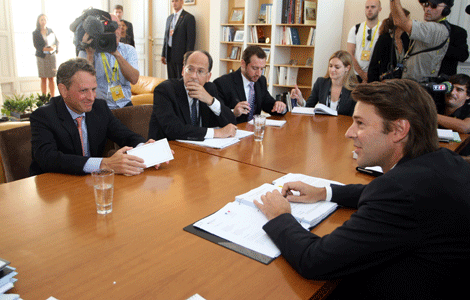Economy
IMF lowers global outlook
Updated: 2011-09-22 07:57
(China Daily)
|
G7 finance ministers and central bank governors in Marseille, France, at a summit on Sept 9. A report by the International Monetary Fund on Tuesday said that US and European policymakers must act more decisively to cut budget deficits. [Chris Ratcliffe / Bloomberg] |
WASHINGTON - The world economy has entered a "dangerous new phase," according to the chief economist of the International Monetary Fund (IMF). As a result, the international lending organization has sharply lowered its economic outlook for the United States and Europe through the end of next year.
The IMF expects the US economy to grow just 1.5 percent this year and 1.8 percent in 2012. That's down from its June forecast of 2.5 percent this year and 2.7 percent next year.
To achieve even that still-low level of growth, the US economy would need to grow at a much faster rate in the second half of the year than its 0.7 percent annual pace in the first half.
Most economists expect growth of between 1.5 percent and 2 percent in the final two quarters. Though an improvement, it wouldn't be enough to lower the unemployment rate. The rate has been 9 percent or higher in all but two months since the recession officially ended more than two years ago.
"The global economy has entered a dangerous new phase," said Olivier Blanchard, the IMF's chief economist. "The recovery has weakened considerably. Strong policies are needed to improve the outlook and reduce the risks."
The IMF has also lowered its outlook for the 17 eurozone countries. It predicts 1.6 percent growth this year and 1.1 percent next year, down from its June projections of 2 percent this year and 1.7 percent next year.
The gloomier forecast for Europe is based on worries that euro nations won't be able to contain their debt crises and keep it from destabilizing the region.
Europe needs to "get its act together" and deal with its worsening sovereign debt crisis, as its debt woes and a painfully slow US recovery could undermine global expansion, the IMF said. It warned that without action those economies could tip back into recession.
The top economist at the global lender, however, singled out Europe as "a major source of worry" as he released the IMF's latest World Economic Outlook report.
"There is a wide perception that policymakers are one step behind markets," Blanchard told reporters. "Europe must get its act together," he added.
Investors have questioned Europe's ability to come up with a convincing solution to its festering sovereign debt crisis, which has rattled confidence and roiled financial markets.
The Fund cut its 2011 and 2012 global growth forecast to 4 percent, shaving projections for almost every region of the world and saying risks remained tilted to the downside.
Just three months ago it had projected an expansion of 4.3 percent for 2011 and 4.5 percent for 2012.
Finance officials from around the world will gather in Washington later this week for semiannual meetings of the IMF and World Bank.
The IMF's message to European leaders was that they should do whatever it takes to preserve confidence in national policies and the euro, and it urged the European Central Bank to lower interest rates if risks to growth persisted.
Standard & Poor's on Monday downgraded its ratings on Italy by one notch and kept its outlook on negative amid mounting pressure to cut its debt. Greece on Tuesday pledged to shrink the country's public sector to win more loans from international lenders such as the IMF.
Greece, which stands at the center of Europe's crisis, is facing increasing pressure from the European Union and IMF to deliver on pledges to slash its deficit.
Senior IMF economist Jorg Decressin told reporters Greece's debt problems were "eminently manageable" and its government was fully committed to staying in the eurozone.
More broadly, he said it was a "crazy proposition" to even talk about a possible break up of the 17-nation currency bloc because European leaders were fully committed to making the euro area work.
Carlo Cotarrelli, the director of the IMF's Fiscal Affairs Department, said there was political will in Europe to support crisis-hit countries, but that policymakers had failed to properly communicate their strategy.
He said the "cacophony of voices" from different eurozone states had confused markets with mixed messages.
"Markets have clearly become more skeptical about the ability of many countries to stabilize their public debt," Blanchard said. "Fear of the unknown is high."
Overall, the IMF predicts global growth of 4 percent for both years. Stronger growth in China, India, Brazil and other developing economies should offset weaker output in the United States and Europe.
Financial turmoil and slow growth are feeding on each other in both the United States and Europe, IMF officials say. Europe's debt crisis is causing banks to reduce lending and hold onto cash. Sharp stock market drops in the US over the summer have hurt consumer and business confidence and will likely reduce spending. That slows growth, which leads many investors to shift money out of stocks and into safer investments, such as Treasury bonds.
In Europe, slower growth will make it harder for stressed economies to get their debt under control.
US and European policymakers must also act more decisively to cut budget deficits, the IMF said.
European banks need to boost their capital buffers more quickly and beyond new minimum levels set to come into force in 2019, the IMF said.
European banks have seen their stocks slide sharply this summer on fears that their exposure to the government debt of shaky countries such as Greece could result in big losses.
Having extra capital would bolster confidence in the banking sector and shield Europe's economy from the effect of jitters in financial markets.
In the US, employers are adding few jobs, many homeowners owe more on their mortgages than their homes are worth, and banks are keeping credit tight.
All those trends are holding back consumer spending. Unemployment is likely to average 9 percent next year, the IMF report said.
US President Barack Obama's proposal to cut taxes and spend more on infrastructure should provide much-needed short-term stimulus, but it needs to be paired with a longer-term plan to reduce the deficit, the report said.
The timing of the budget cuts is key, Blanchard said. Budget cuts "cannot be too fast or it will kill growth", he said in a statement. "It cannot be too slow or it will kill credibility."
AP-Reuters
E-paper

The snuff of dreams
Chinese collectors have discovered the value of beautiful bottles
Perils in relying on building boom
Fast forward to digital age
Bonds that tie China. UK
Specials

Let them eat cake
Cambridge University graduate develops thriving business selling cupcakes

A case is laid to rest
In 1937, a young woman'S body was found in beijing. paul french went searching for her killer

Banking on change
Leading economist says china must transform its growth model soon

